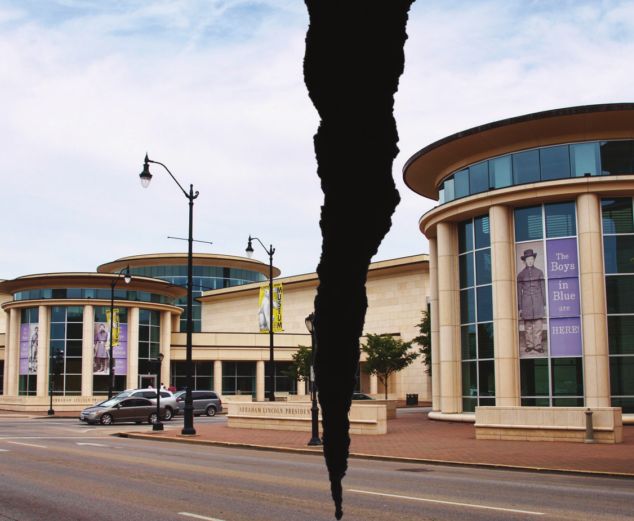
An overdue policy on the library
Is independence feasible for the state’s historical library?
DYSPEPSIANA | James Krohe Jr.
Is the Abraham Lincoln Presidential Library and Museum a museum with a library attached? Or is it a library with a museum attached? The two institutions are like conjoined twins, one of whom has a wonky heart; the best chance for each might be to separate them, in spite of the risks that surgery poses. Debating that option would resume a conversation that began in earnest in the 1870s, as I learned from a 1975 article about the early history of what used to be the Illinois State Historical Library by Roger Bridges, the library’s longtime research historian.
In that article, for example, we learn that 2005 was not the first year that the library was attached awkwardly to a museum. In 1877, the legislature authorized creation of a library to permanently preserve materials “illustrative of the early history of this state” and gave the new, state-sponsored Natural History Museum the administrative responsibility for assembling it.
The legislative charge was laughably modest; the museum director was asked merely to pull stuff off the shelves of the existing state library material about early Illinois and reshelf it in separate rooms. Even a columnist could have done it – except the then-director (a geologist) never bothered, and the state’s new history library existed only on paper for more than a decade.
If at first, etc. etc. An Illinois State Historical Library independent of the natural history museum was created in 1889, to be run by trustees appointed by the governor. It was given a librarian and not much else. Disdaining to actually buy books to fill its shelves, the State of Illinois opted to defray some of the expenses of a private historical society out of the library’s budget; said society was expected to do out of enthusiasm what the state wouldn’t do out of stinginess, which was build a collection and disseminate information.
As the ALPLM has proved, inviting private citizens to help run public institutions doesn’t always go well. Whoever controlled the new Illinois State Historical Society, for instance, would control the library, and to some extent decide what was History in Illinois. Academics involved with the society thought its amateur members not up to the job; for their part, the amateurs in charge for a time refused to accept papers to be given at meetings by university professors because they would “be so dry that prospective members would stay away.” In addition to the academic/lay split there was a Lincoln-Everything Else split, and the only reason there wasn’t a Chicago/Downstate split was because Chicago already had its own, better historical library, and didn’t need the state version.
Then there was the Springfield problem. One lay faction, explained Bridges, “feared the society and its library would be hijacked” by the University of Illinois (a fear that would later be expressed about the ALPLM, with much less justification) while the history professors in Urbana “feared that a state historical society located elsewhere, especially in Springfield, would become so mired in politics that it would be useless.”
No wonder people find Illinois history dull – they’ve heard it all before.
Where, oh where does wisdom lie? In the morning, I am convinced that the library’s Lincoln artifacts should be made available on loan to the museum (on condition that they be properly cared for) while its Lincoln documents and non-Lincoln holdings remain in a library of statewide history made independent of the museum. At lunch I remember that the old ISHL was independent for decades, and ended up in what amounted to a basement storeroom under the Old Capitol.
In the afternoon, I decide that the existing Illinois State Historical Society, now a private nonprofit group that was cut loose by the state in 1997, ought to be put in charge of such a library. Alas, in a fair budget fight over scarce history dollars – and which Statehouse budget fight was ever fair? – the society wouldn’t stand a chance against the museum. Making the library again part of the State Library, as it was once, would give it a protector of sorts, but introduces the risk of intralibrary squabbles over funding, space and staffing that the larger library is likely to win.
By dinner I have decided that the State of Illinois will never do a good job of running the library because it can’t itself do a good job of running anything. The library of the University of Illinois might, though. The Urbana library has the expertise, it has (through the university) budget clout and it has experience managing state historical collections. (It boasts both Illinois and Lincoln collections of its own.) Brookens Library at the Springfield campus would be the more likely choice logistically and politically. But by bedtime I remember that these days this Illinois institution of higher learning is run more like an Illinois state institution than it is like an institution of higher learning.
Still, it’s about the only thing that hasn’t been tried yet. And if it doesn’t work, at least we will know how not to do it next time. In Illinois, that’s progress.
Contact James Krohe Jr. at [email protected].
Editor’s note
Mayor Mike Houston lost Tuesday’s primary election, but he can hold his
head high for running a campaign focused on the issues and his record as
mayor, which isn’t nearly as bad as the fi nal vote tally might lead
some to believe. There was ample opportunity to go negative, but Houston
resisted the urge and stayed on the high road. We only wish that
certain of our colleagues in the media had shown the same level of
professionalism and maturity. –Fletcher Farrar, editor and publisher